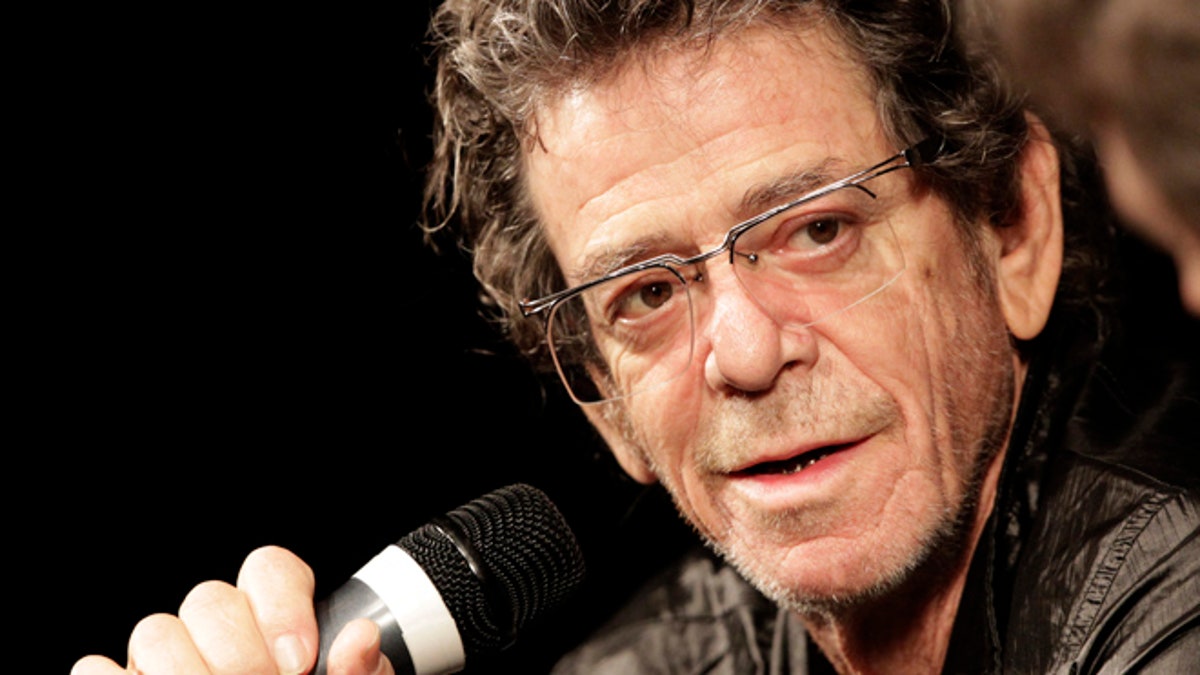
April 20, 2010: American singer Lou Reed smiles during a session after the world premiere of his first film "Red Shirley" at the Vision du Reel Documentary film Festival in Nyon, Switzerland. The film is about an interview Reed conducts with his cousin on the eve of her hundredth birthday. (Reuters)
Lou Reed, the frontman of the rock band the Velvet Underground, has died at age 71 from an ailment related to his recent liver transplant, his literary agent says.
Andrew Wylie told the Associated Press that Reed died Sunday morning in Southampton, N.Y. Reed shared a home in Southampton with his wife and fellow musician, Laurie Anderson, whom he married in 2008.
Reed had undergone a liver transplant in May. He was hospitalized in July for severe dehydration, Variety reports.
The Velvet Underground consisted of Reed, who was the lead vocalist and guitarist, John Cale, a keyboardist and viola player, Sterling Morrison, a guitarist, and drummer Maureen Tucker. The group played their first show in 1965 and became the house band at Warhol’s Factory studio the following year, according to a biography of the band on the Rock and Roll Hall of Fame’s website. They became the centerpiece of Warhol’s “Exploding Plastic Inevitable” multimedia events.
Reed was born in Brooklyn on March 2, 1942. He graduated from Syracuse University in 1964 and met Cale while working as a songwriter-for-hire at Pickwick Records, according to Variety. The two formed a group called the Primitives, which later renamed to the Velvet Underground after Morrison and Tucker joined.
Reed’s career produced some of the most covered songs in rock history: “Sweet Jane,” “Satellite of Love” and “Walk on the Wild Side,” in addition to a release of sheer industrial noise and a 2011 collaboration with Metallica, among other projects, Variety reports.
Reed never approached the commercial success of such contemporaries as the Beatles and Bob Dylan, but no songwriter to emerge after Dylan so radically expanded the territory of rock lyrics. And no band did more than the Velvet Underground to open rock music to the avant-garde -- to experimental theater, art, literature and film, to William Burroughs and Kurt Weill, to John Cage and Warhol, Reed's early patron and longtime inspiration
Indie rock essentially began in the 1960s with Reed and the Velvets. Likewise, the punk, New Wave and alternative rock movements of the 1970s, '80s and '90s were all indebted to Reed, whose songs were covered by R.E.M., Nirvana, Patti Smith and countless others.
"The first Velvet Underground record sold 30,000 copies in the first five years," Brian Eno, who produced albums by Roxy Music and Talking Heads among others, once said. "I think everyone who bought one of those 30,000 copies started a band!"
Reed's trademarks were a monotone of surprising emotional range and power; slashing, grinding guitar; and lyrics that were complex yet conversational, designed to make you feel as if Reed were seated next to you.
Known for his cold stare and gaunt features, he was a cynic and a seeker who seemed to embody downtown Manhattan culture of the 1960s and '70s and was as essential a New York artist as Martin Scorsese or Woody Allen.
Reed's New York was a jaded city of drag queens, drug addicts and violence, but it was also as wondrous as any Allen comedy, with so many of Reed's songs explorations of right and wrong and quests for transcendence.
He had one Top 20 hit, "Walk on the Wild Side," and many other songs that became standards among his admirers, including "Heroin," "Pale Blue Eyes" and "All Tomorrow's Parties."
Raised on doo-wop and Carl Perkins, Delmore Schwartz and the Beats, Reed helped shape the punk ethos of raw power, the alternative rock ethos of irony and droning music and the art-rock embrace of experimentation, whether the dual readings of Beat-influenced verse for "Murder Mystery," or, like a passage out of Burroughs' "Naked Lunch," the orgy of guns, drugs and oral sex on the Velvets' 15-minute "Sister Ray."
An outlaw in his early years, Reed would eventually perform at the White House, have his writing published in The New Yorker, be featured by PBS in an "American Masters" documentary and win a Grammy in 1999 for best long-form music video. The Velvet Underground was inducted into the Rock and Roll of Fame in 1996, and its debut album, "The Velvet Underground & Nico," was added to the Library of Congress' registry in 2006.
He was one of rock's archetypal tough guys, but he grew up middle-class -- an accountant's son raised on Long Island. He hated school, loved rock n' roll, fought with his parents and attacked them in song for forcing him to undergo electroshock therapy as a supposed "cure" for being bisexual. "Families that live out in the suburbs often make each other cry," he later wrote.
At Warhol's suggestion, they performed and recorded with the sultry, German-born Nico, a "chanteuse" who sang lead on a few songs on their debut album. A storm cloud over 1967's Summer of Love, "The Velvet Underground & Nico" featured a now-iconic Warhol drawing of a peelable banana on the cover.
The Velvets juxtaposed childlike melodies with dry, affectless vocals on "Sunday Morning" and "Femme Fatale." On "Heroin," Cale's viola screeched and jumped behind Reed's obliterating junkie's journey, with his sacred vow, "Herrrrrr-o-in, it's my wife, and it's my life," and his cry into the void, "And I guess that I just don't know."
Reed made just three more albums with the Velvet Underground before leaving in 1970. Cale was pushed out by Reed in 1968 (they had a long history of animosity) and was replaced by Doug Yule. Their sound turned more accessible, and the final album with Reed, "Loaded," included two upbeat musical anthems, "Rock and Roll" and "Sweet Jane," in which Reed seemed to warn Velvets fans -- and himself -- that "there's even some evil mothers/Well they're gonna tell you that everything is just dirt."
His albums in the '70s were praised as daring experiments or mocked as embarrassing failures, whether the ambitious song suite "Berlin" or the wholly experimental "Metal Machine Music," an hour of electronic feedback. But in the 1980s, he kicked drugs and released a series of acclaimed albums, including "The Blue Mask," "Legendary Hearts" and "New Sensations."
He played some reunion shows with the Velvet Underground and in 1990 teamed with Cale for "Drella," a spare tribute to Warhol. He continued to receive strong reviews in the 1990s and after for such albums as "Set the Twilight Reeling" and "Ecstasy," and he continued to test new ground, whether a 2002 concept album about Edgar Allan Poe, "The Raven," or a 2011 collaboration with Metallica, "Lulu."
The Associated Press contributed to this report.














































